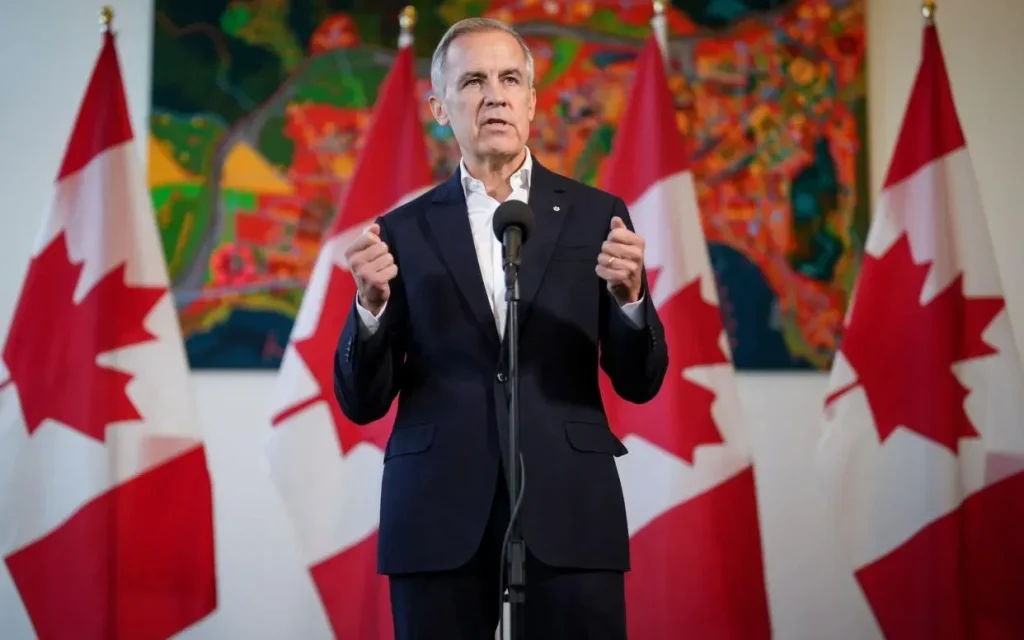Mark Carney’s reflections on electoral reform have sparked discussions about the future of Canada’s electoral system amidst a backdrop of political uncertainty. The Liberal Leader recently expressed that while he is ‘open’ to considering electoral reform, it is not a primary focus given the looming economic and security challenges facing the nation. This perspective draws attention to the ongoing discourse around electoral reform in Canada, especially as it relates to Prime Minister Justin Trudeau’s previous electoral pledge for a system that promotes proportional representation. As the debate continues, Carney emphasizes the need for neutrality in the pursuit of reforms, aiming to foster an objective process rather than one that favors political agendas. With the implications of these discussions so significant, the question of how to navigate Canada’s electoral system remains ever-relevant in the realm of Mark Carney politics and beyond.
The dialogue surrounding electoral change in Canada is both multifaceted and essential, reflecting a national desire for an improved political landscape. Recent comments from Liberal leader Mark Carney highlight his willingness to explore avenues for adjusting the electoral framework but underscore that immediate concerns take precedence over such deliberations. Conversations akin to this hark back to previous commitments made during Trudeau’s administration, where a movement toward alternative voting methods, such as proportional representation, was tentatively endorsed but ultimately sidelined. These developments illustrate an ongoing tension within the Canadian political scene regarding how best to serve the electorate while addressing urgent social and economic needs. As we look at potential reforms, it’s vital to consider not only public opinion but also the overarching structural considerations that could influence the future of Canada’s governance.
Mark Carney’s Position on Electoral Reform
Mark Carney, the Liberal Leader, recently expressed his openness to revisiting electoral reform, although he clarified it is not a priority at this time. This stance reflects a significant shift from previous Liberal promises, notably those made by Justin Trudeau. Carney’s caution stems from the current political landscape, dominated by pressing economic and security issues that demand more immediate attention. He was careful to articulate that any reforms should be approached with neutrality and objectivity, avoiding perceptions of bias that could arise from political leaders being too involved in the process.
Moreover, Carney’s approach highlights a broader trend in Canadian politics where electoral reform is often discussed in theory but remains stagnant in practice. With Trudeau’s earlier commitment to abandon the first-past-the-post system now seen as one of his regrets, the desire for a more proportional representation in Canada has not yet gained sufficient political traction. Carney’s acknowledgment of this issue suggests that while he is amenable to exploring electoral reform in the future, the present circumstances call for a focus on more immediate challenges facing the nation.
The Historical Context of Electoral Reform in Canada
The history of electoral reform in Canada has been marked by ambition and disappointment. Under Trudeau, the government committed to eliminating the first-past-the-post electoral system, with promises that the 2015 election would be the last conducted under this format. However, after a thorough analysis and the acknowledgment of a lack of consensus among the political parties, including the Liberals, the push for reform was ultimately abandoned. This failure illustrates the complexities of changing deeply entrenched electoral systems, especially when political interests are aligned with the status quo.
In December 2016, an all-party committee recommended a referendum to consider moving toward proportional representation, highlighting a broad interest in reform across various political spectrums. Yet, diverging opinions on how best to implement these changes, particularly regarding the necessity of a referendum, led to further stagnation. As Carney reflects on these past commitments and missteps, it becomes clear that any future discussions surrounding electoral reform must navigate the same delicate balance of political will, public support, and the imperative for democratic fairness.
Electoral Priorities Amidst Current Crises
In the wake of numerous economic challenges and a growing emphasis on national security, electoral reform appears to be taking a backseat in the political priorities of Canadian leaders. Mark Carney’s recent statements underscore this reality as he highlighted the need to address pressing issues impacting Canadians right now. The focus on economic recovery and enhanced security measures is seen as paramount at this juncture, thereby sidelining discussions surrounding changes to the electoral system. Carney aims to reassure voters that the government’s current focus remains on their immediate needs.
This prioritization aligns with Carney’s viewpoint that reforming the electoral system should not occur at the expense of addressing urgent societal concerns. By adopting a pragmatic approach, he indicates that any amendments to Canada’s electoral framework will be considered only after the more pressing demands of governance have been met. This reflects a broader understanding in political discourse that while electoral reform remains a critical issue, the timing and context of implementing such changes are equally important.
The Legacy of Trudeau’s Electoral Promises
Trudeau’s tenure has been marked by notable pledges, with electoral reform being one of the most significant promises that ultimately went unfulfilled. The shift away from this commitment has left many Canadians feeling disillusioned, especially those who championed the idea of proportional representation as a means to enhance democratic engagement. The acknowledgment of this failure as one of Trudeau’s greatest regrets speaks volumes to the weight that electoral reform carries within Canadian politics and society.
By reflecting on his administration’s choices, Trudeau highlights a critical aspect of political leadership — the difficulty of keeping promises in a complex political landscape. As mentioned by Carney, the shifting political priorities amid crises may necessitate a re-evaluation of electoral commitments by future leaders. While Trudeau publicly entertained notions of ranked ballots and proportional representation, the reality of delivering on these promises was fraught with opposition and lack of consensus, serving as a cautionary tale for those currently in power.
Future Directions for Electoral Reform
As discussions around electoral reform resurface under Carney’s leadership, the path forward appears fraught with both challenges and opportunities. With the pressing issues of the economy and security demanding immediate focus, any future electoral reforms will likely require a combination of public interest and political will. While Carney has expressed a willingness to explore reform, it remains contingent upon the current administration’s ability to manage ongoing crises. This dynamic may shape how swiftly and effectively Canada can engage in discussions on potentially transformative electoral changes.
Furthermore, any potential electoral reforms must be informed by lessons learned from past initiatives, particularly those that have failed to achieve consensus. Engaging Canadians in dialogue and fostering a greater understanding of the implications of different electoral systems will be critical in building momentum for reform. Not only does this enhance democratic inclusivity, but it also reinforces the message that leaders are committed to representing the will of the people while maintaining the integrity of the electoral process.
The Role of Public Opinion in Electoral Change
Public sentiment plays a crucial role in shaping the discourse around electoral reform in Canada. As seen in the past, grassroots movements and calls for change can compel political leaders to reconsider their stances on electoral systems. Carney acknowledges this dynamic by emphasizing the importance of engaging Canadians in meaningful discussions about their electoral preferences. Understanding public opinion not only informs policymakers but also highlights the democratic imperative of listening to citizens as stakeholders in the process.
Polling data and surveys indicate a range of preferences among Canadians regarding electoral systems, including a significant interest in alternative models that foster greater equity. By tapping into this interest, the Liberal party, under Carney’s leadership, can work to rebuild trust and confidence in the political system. This engagement can pave the way for a more informed electorate, equipped to participate in discussions about the future direction of Canada’s electoral framework.
Implications of Proportional Representation
The debate over proportional representation remains a focal point in the electoral reform conversation, especially as past proposals have demonstrated both support and resistance among various political factions. Advocates argue that implementing a proportional representation system in Canada could lead to a more inclusive and representative government, reflecting the diverse political landscape of the nation. Carney’s openness to the idea suggests that the Liberal party may not entirely dismiss its potential, even as immediate priorities overshadow long-term reforms.
However, a critical challenge remains: achieving consensus across the political spectrum. Past experiences, particularly the Liberals’ hesitance to align with other parties on the best approach to reform, underscore the complexities involved in advocating for substantial changes. As discussions progress, Carney and his team will need to navigate inter-party dialogues carefully to build a coalition that supports changes beneficial not only for the current administration but also for the broader democratic framework of Canada.
Challenges to Mark Carney’s Electoral Reform Agenda
While Mark Carney is open to the idea of electoral reform, several challenges could impede his efforts to enact meaningful change. First and foremost is the dominance of pressing crises that overshadow electoral discussions and the urgent need for policy responses. Given the current political climate marked by economic instability and security concerns, it remains to be seen if Carney will be able to shift focus toward electoral reform without alienating voters who prioritize immediate solutions to these issues.
Additionally, the lessons learned from previous administrations’ attempts at reform, particularly under Trudeau, will be essential in shaping Carney’s agenda. The hesitance to embrace electoral changes was often rooted in the fear of losing political capital. As Carney contemplates the implications of going down this road, he must carefully maintain a balance between advocating for change and ensuring his party remains focused on the day-to-day governance challenges that Canadians expect their leaders to address.
The Future of Canadian Democracy and Electoral Engagement
The future of Canadian democracy hinges significantly on the government’s ability to engage citizens in electoral processes and discussions surrounding reform. As Carney gestures toward potential advancements in electoral representation, creating avenues for public discourse will enhance civic involvement and the legitimacy of government decisions. In a democracy, engaging the electorate in meaningful ways can alleviate skepticism and foster a more robust political culture.
To truly revolutionize the electoral system and reflect the population’s preferences, Carney and future leaders must prioritize open communication and education around different electoral frameworks. This approach not only promotes informed voting but also ensures that any reform efforts are rooted in public consensus, aligning decision-making processes with the democratic values Canadians cherish. Ultimately, the active participation of citizens will be a cornerstone in navigating the future intricacies of electoral reform.
Frequently Asked Questions
What is Mark Carney’s stance on electoral reform in Canada?
Mark Carney has expressed that he is ‘open’ to the idea of electoral reform in Canada but does not consider it a current priority. He emphasized that given the pressing economic and security issues the country faces, electoral reform will not be included in his party’s platform at this time.
How does Mark Carney view the electoral reform promises made by Justin Trudeau?
Mark Carney acknowledges that Justin Trudeau’s pledge for electoral reform, specifically to abandon the first-past-the-post system, is not a commitment he plans to pursue actively. Carney prefers a neutral stance to ensure any process surrounding electoral reform is objective and does not favor one side.
Why was electoral reform not prioritized by Trudeau’s government?
Trudeau initially pledged to reform the electoral system, but this was abandoned due to a lack of consensus among parties. The self-imposed deadline for implementing changes by 2019 was deemed too rushed, leading to his decision to focus on other pressing matters instead of fulfilling the electoral pledge.
What are the implications of Mark Carney’s views on Canada’s electoral system?
Mark Carney’s views suggest a cautious approach to electoral reform during a time of crisis. He believes that while electoral reform is important, the focus should be on immediate challenges. This indicates a potential delay in addressing issues related to proportional representation in Canada.
How does the lack of commitment to electoral reform affect public trust in the political system?
The ongoing hesitance around electoral reform, highlighted by both Trudeau’s abandonment of his pledge and Carney’s cautious approach, may lead to diminished public trust in the political system. Citizens may feel that their government is not fully committed to enhancing democracy and ensuring fair representation.
What were the recommendations of the all-party committee on electoral reform in Canada?
In December 2016, the all-party committee recommended conducting a referendum to transition to a proportional representation system. However, due to disagreements among the parties, particularly from the ruling Liberals, the recommendations failed to materialize into concrete electoral reform proposals.
What electoral system changes did Justin Trudeau initially propose?
Justin Trudeau proposed to end the first-past-the-post electoral system in favor of a new system, with discussions leaning towards implementing ranked ballots, which allow voters to rank candidates by preference. He later expressed a regret for not advancing these changes before leaving office.
What challenges does Carney associate with pursuing electoral reform in Canada?
Carney associates the challenges of pursuing electoral reform with current economic and security crises, suggesting that these pressing issues must take priority over structural changes in democracy, such as transitioning to proportional representation or altering the electoral system.
How does public opinion influence Mark Carney’s stance on electoral reform?
Public opinion plays a significant role in influencing political leaders like Mark Carney. While he is open to electoral reform, he indicates that prevailing public and party consensus is lacking, which complicates the prospect of advancing significant changes to the electoral system in Canada.
What is the significance of Mark Carney’s statement about neutrality in electoral reform?
Carney’s emphasis on neutrality in electoral reform signifies his intent to approach the topic without bias, thereby ensuring any process or outcome is seen as fair and objective, rather than driven by political gain. This approach aims to foster trust and legitimacy in a potential electoral reform process.
| Key Points | Details |
|---|---|
| Mark Carney’s Position | Carney is open to discussing electoral reform but does not prioritize it due to current pressing issues. |
| Past Commitments | Justin Trudeau pledged in 2015 that federal elections would switch from first-past-the-post, a commitment he later abandoned. |
| Consensus Issues | An all-party committee suggested a referendum but a lack of consensus among major parties hindered progress. |
| Current Focus | Carney emphasizes focusing on immediate challenges like the economic crisis rather than structural electoral changes. |
| Future Considerations | Carney believes once immediate priorities are addressed, discussions on electoral reform could resume. |
Summary
Mark Carney electoral reform has been a topic of discussion, but Carney has clarified it is not among his immediate priorities given the current political climate. While he is open to revisiting this reform, he emphasizes the importance of addressing pressing economic and security issues first. His approach contrasts with previous commitments made by Justin Trudeau, highlighting a cautious stance on electoral changes as Canada prioritizes other pressing challenges.



